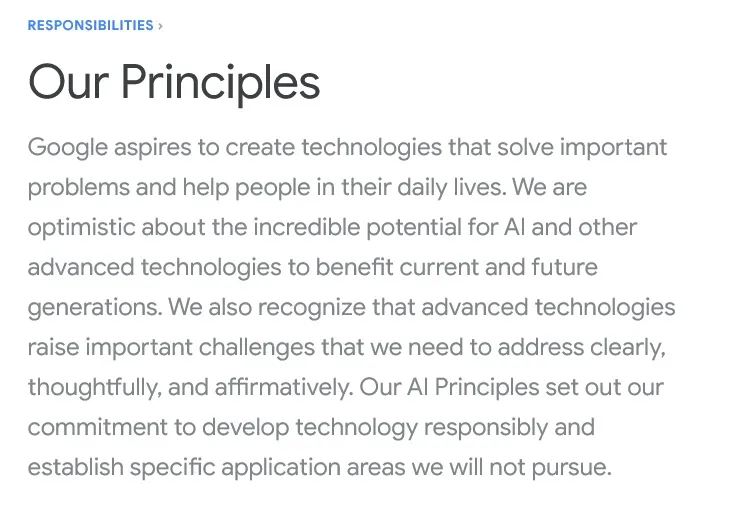On February 4, Google updated its AI principles, which outline the ethical framework guiding the use of artificial intelligence within its products and services. This revision marks a significant shift, moving away from a clear stance against developing AI weapons and surveillance tools, and instead focusing solely on positive applications of AI technology. The importance of Google AI principles cannot be understated, as they set the tone for the company’s approach to AI ethics, particularly in light of rising discussions about AI regulations and military AI applications. By omitting explicit commitments about what they will not pursue, Google opens the door to a broader interpretation of its AI initiatives, potentially creating room for ambiguity in its artificial intelligence policy. As the landscape of AI continues to evolve, understanding these principles is crucial for stakeholders concerned with the ethical implications of AI-driven technologies.
Recently, Google made updates to its guidelines regarding artificial intelligence, which are essential for understanding its operational ethos in this rapidly advancing field. These guidelines, often referred to as AI ethics, serve as a blueprint for how the tech giant intends to develop and implement AI technologies responsibly. The absence of restrictions in its revised framework raises questions about the company’s future engagements, especially concerning military applications of AI. Furthermore, this shift reflects a broader trend in the industry, where many tech firms are grappling with the balance between innovation and ethical obligations. By examining these changes, we gain insights into the evolving landscape of artificial intelligence policy and its potential implications for society.
Understanding Google’s Updated AI Principles
On February 4, Google made significant updates to its AI principles, a crucial document that governs the ethical use of artificial intelligence in its products and services. The previous version was structured into two clear segments: the objectives for AI applications and a list of applications the company would not pursue. However, the latest revision has removed the latter section entirely, shifting the focus solely to what Google is willing to do with AI. This shift raises questions about accountability and transparency in Google’s AI development, particularly regarding the potentially controversial areas of AI ethics and military applications.
The implications of this change are profound. By eliminating the commitments to refrain from developing AI weapons or surveillance tools, Google has opened itself up to a broader interpretation of its AI capabilities. This flexibility allows the company to engage in more aggressive AI research and development without the constraints of earlier promises. Moreover, the lack of clear boundaries regarding what constitutes appropriate human oversight in AI projects complicates the landscape, making it difficult for stakeholders to hold the company accountable for its actions.
AI Ethics and Corporate Responsibility
The removal of explicit commitments from Google’s AI principles raises significant concerns about AI ethics and corporate responsibility. By emphasizing what it will do rather than what it won’t, Google appears to prioritize operational flexibility over ethical accountability. This shift could lead to a slippery slope where the company justifies the development of controversial AI technologies under the guise of rigorous design and oversight, risking the potential for harmful outcomes. Stakeholders, including advocacy groups and concerned citizens, must scrutinize these developments to ensure that ethical considerations remain at the forefront of AI innovation.
Furthermore, the need for comprehensive AI regulations is more pressing than ever in light of these changes. As companies like Google expand their AI capabilities into potentially contentious areas, there must be a robust framework in place to govern their actions. This involves not only internal guidelines but also external regulations that enforce transparency and accountability in AI development. By fostering a collaborative dialogue between tech companies, regulators, and the public, we can work towards ensuring that AI technologies are developed and deployed ethically and responsibly.
The Future of Military AI Applications
As Google navigates the evolving landscape of artificial intelligence, its past involvement in military AI applications, particularly through Project Maven, serves as a critical reference point. The initial backlash from employees led to a commitment to not engage in developing AI weapons. However, the recent updates to its AI principles may signal a shift in this stance, allowing Google to reconsider its position on military contracts and applications. This poses important questions about the ethical implications of using AI in warfare and how tech companies should approach military collaborations.
In a world where competitors like Meta, OpenAI, and Amazon are already exploring military AI applications, Google’s potential re-entry into this sector could significantly impact the broader tech industry. As military AI applications become more common, the need for ethical guidelines and regulations becomes increasingly urgent. Companies must confront the moral implications of their technologies and the consequences of their deployment in military contexts. The conversation around AI in the military should not only focus on technological advancement but also on the ethical standards that guide these developments.
Transparency in AI Development
Transparency is a cornerstone of ethical AI development, yet Google’s updated principles appear to obfuscate rather than clarify its intentions. By eliminating the section that detailed what AI applications it would not pursue, Google has taken a step back from providing clear guidelines that could be scrutinized by external stakeholders. This lack of transparency creates a vacuum where questions about ethical boundaries, oversight, and accountability remain unanswered, fostering mistrust among consumers, employees, and the broader public.
To rebuild trust, Google must prioritize clear communication regarding its AI initiatives and the safeguards it intends to implement. This includes defining what ‘appropriate human oversight’ entails and how it will mitigate potential biases or harmful outcomes. By engaging in open discussions with stakeholders and being forthcoming about its AI projects, Google can work towards establishing a more transparent framework that aligns with both ethical standards and public expectations.
The Impact of AI Regulations on Tech Companies
As the landscape of artificial intelligence evolves, the role of AI regulations becomes increasingly critical. With Google’s recent changes to its AI principles, there is an urgent need for regulatory frameworks that can effectively govern the development and deployment of AI technologies. These regulations should aim to establish clear boundaries for what is considered acceptable in AI applications, particularly in sensitive areas like military technology and surveillance.
Tech companies must recognize that a proactive approach to AI regulations can not only safeguard ethical standards but also enhance public confidence in their technologies. By actively participating in the development of these regulations, companies like Google can help shape a landscape that prioritizes responsible innovation while also mitigating the risks associated with AI applications. This collaborative effort is essential in ensuring that technological advancements align with societal values and ethical considerations.
Google’s Competitive Landscape in AI
In the competitive arena of artificial intelligence, Google’s strategic choices are closely watched by industry peers and analysts alike. The company’s decision to update its AI principles reflects a broader trend among tech giants to engage more deeply in AI development, including military applications. As competitors like Meta, OpenAI, and Amazon explore similar avenues, Google’s new stance may influence how these companies approach their own ethical frameworks and AI policies.
This evolving competitive landscape highlights the need for clear standards and practices that govern AI development across the industry. As companies strive to innovate while maintaining a commitment to ethical considerations, collaboration among tech giants may be crucial in establishing a set of best practices. By prioritizing ethical AI development, companies can not only enhance their public image but also contribute to a more responsible and accountable technology sector.
Employee Advocacy in AI Development
The recent updates to Google’s AI principles have reignited discussions about employee advocacy within tech companies. In the past, Google’s workforce has demonstrated its power by protesting against military contracts and demanding ethical practices in AI development. As the company now appears to have more leeway in its AI applications, it will be interesting to see if employees will once again mobilize to voice their concerns about potential military collaborations or ethical compromises.
Employee advocacy plays a vital role in shaping corporate policies, especially in sectors as impactful as artificial intelligence. As tech companies navigate complex ethical landscapes, the voices of employees can provide essential insights into the moral implications of their work. Google’s workforce, equipped with a strong understanding of AI ethics, can influence the company’s trajectory by pushing for transparency and accountability in its AI initiatives, ensuring that ethical considerations are not sidelined in favor of profit.
The Role of AI in Society
As artificial intelligence becomes increasingly integrated into various sectors of society, its impact on daily life cannot be overstated. From healthcare to finance and even national security, AI technologies have the potential to transform how we live and work. However, with these advancements come significant ethical considerations that must be addressed to ensure that AI serves the greater good.
The responsibility lies with tech companies, regulators, and society as a whole to ensure that AI is developed and implemented in ways that are beneficial rather than harmful. This includes fostering an ongoing dialogue about the implications of AI technologies and establishing guidelines that prioritize human welfare. By collectively addressing these challenges, we can work towards a future where AI enhances our lives while upholding ethical standards.
The Importance of AI Ethics in Corporate Strategy
Incorporating AI ethics into corporate strategy is essential for tech companies looking to build sustainable and responsible business models. As companies like Google revise their AI principles, it is crucial to recognize that ethical considerations should not be an afterthought but a core component of their operational framework. By embedding ethical standards into their strategic planning, companies can navigate the complexities of AI development while maintaining public trust.
Moreover, having a clear commitment to AI ethics can differentiate companies in a competitive market, attracting consumers who prioritize responsible technology. By demonstrating accountability and a willingness to engage with ethical dilemmas, tech companies can foster a positive reputation and contribute to a culture of responsibility within the industry. This proactive approach will ultimately benefit both businesses and society by ensuring that technological advancements align with ethical expectations.
Frequently Asked Questions
What are Google AI principles and why were they updated?
Google AI principles are guidelines that outline how Google intends to use artificial intelligence ethically in its products and services. The update on February 4 removed commitments regarding AI applications the company won’t pursue, focusing instead on what it will do, which allows for greater flexibility in AI deployment.
How do the updated Google AI principles impact AI ethics?
The updated Google AI principles raise questions about AI ethics by eliminating explicit commitments against developing military AI applications or surveillance tools. This shift allows Google to pursue various AI projects with less accountability, potentially undermining ethical standards.
What is the significance of Google’s commitment to ‘appropriate human oversight’ in AI?
Google’s commitment to ‘appropriate human oversight’ in its AI principles is significant because it lacks a clear definition, which raises concerns about the company’s accountability. This vague commitment could allow Google to implement AI solutions without stringent oversight, impacting ethical AI deployment.
Are Google AI principles aligned with current AI regulations?
The updated Google AI principles may not fully align with current AI regulations, as they provide more autonomy to the company without strict guidelines against military applications or harmful AI technologies. This could lead to potential conflicts with emerging global AI regulations aiming to ensure ethical use.
What prompted the creation of the original Google AI principles document?
The original Google AI principles document was created in response to employee protests against the company’s involvement in the U.S. Department of Defense’s Project Maven. This incident highlighted the need for a framework to guide ethical AI use and address employee concerns about military applications.
How might Google’s updated AI principles affect military AI applications?
With the removal of the section outlining AI applications Google will not pursue, the updated principles may enable Google to explore military AI applications more freely. This change could lead to renewed involvement in defense projects, raising ethical concerns among employees and the public.
What implications do Google’s AI principles have for the future of artificial intelligence policy?
Google’s AI principles could set a precedent for artificial intelligence policy, influencing how other tech companies approach AI ethics. The flexibility granted by the updated principles may encourage similar policies, potentially diluting commitments to ethical AI development across the industry.
How do Google AI principles relate to the concept of AI ethics?
Google AI principles are directly related to AI ethics as they outline the company’s approach to responsible AI usage. However, the recent update, which emphasizes what Google will do without clear commitments on what it won’t do, complicates the ethical landscape and raises concerns about accountability.
What are the potential risks of the updated Google AI principles?
The potential risks of the updated Google AI principles include decreased accountability, increased likelihood of pursuing controversial AI projects, and ambiguity in ethical standards. This could lead to misuse of AI technologies and undermine public trust in Google’s commitment to ethical AI.
How do Google’s AI principles compare to other tech companies’ AI policies?
Google’s AI principles, especially after the recent update, may diverge from other tech companies’ policies by allowing for more flexibility in pursuing military AI applications. Companies like Meta and OpenAI have similar concerns, indicating a trend in the tech industry towards more lenient AI policies.
| Key Point | Details |
|---|---|
| Update Date | February 4, 2023 |
| Previous Structure | Divided into ‘Objectives for AI applications’ and ‘AI applications we will not pursue’ |
| Removal of Section | ‘AI applications we will not pursue’ has been removed, focusing only on what Google will do. |
| Importance of Commitments | Removing commitments allows for flexibility in pursuing various AI applications without accountability. |
| Human Oversight Definition | Google’s vague definition of ‘appropriate human oversight’ raises concerns about accountability. |
| Background | Original AI principles were created after employee protests against Project Maven, a military contract. |
| Current Industry Trends | Competitors like Meta, OpenAI, and Amazon are engaging in military applications of AI technology. |
| Future Concerns | Increased flexibility may allow Google to re-enter defense contracts, raising ethical concerns. |
Summary
The Google AI principles have undergone significant changes as of February 4, 2023, reflecting a shift in the company’s approach to artificial intelligence. While the previous version included a clear stance on the applications Google would not pursue, the updated document eliminates these commitments, focusing instead on what the company intends to do. This change raises important questions about accountability and ethical considerations, particularly regarding military applications of AI. As Google navigates its role in the rapidly evolving AI landscape, the implications of its principles will be closely monitored by both employees and the public.








